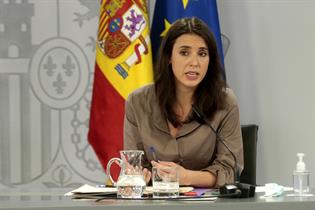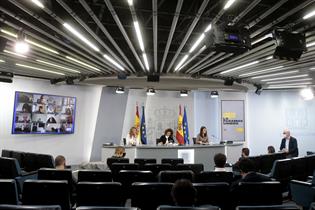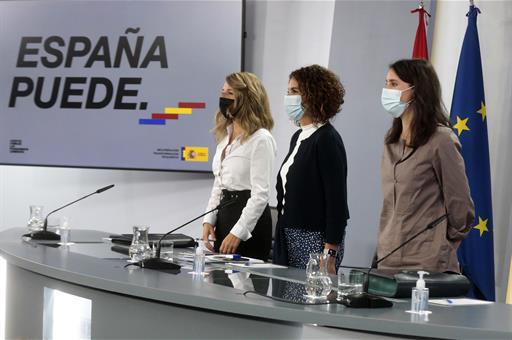Council of Ministers
Government approves measures to guarantee equality between women and men at work
Council of Ministers - 2020.10.13
Moncloa Palace, Madrid
The government approved two Royal Decrees designed to guarantee full equality between women and men at work which, according to the Minister for Work and Social Economy, Yolanda Díaz, and the Minister for Equality, Irene Montero, will place Spain at the forefront in this field in Europe. The texts assign the Regulations on Wage Equality and Equality Plans with the legal status of laws.
"Henceforth, the situation whereby a man and a woman can receive different pay in our country, in our companies, no longer exists", declared the Minister for Work at a press conference following the Council of Ministers. Yolanda Díaz stated that this new regulation guarantees the rectification of wage discrimination in companies, an inequality that she described as a "democratic aberration", since it breaches the fundamental rights of half the population.
Both ministers recalled that the wage gap is not limited to pay, but is also reflected in job insecurity and the difficulties in work/life balance, and underlined the direct relationship between the equality policies of a company and its efficiency.
Wage remuneration between women and men
 Foto: Pool Moncloa/José María CuadradoThe Royal Decree on wage equality facilitates the identification of wage discrimination through a set of transparency instruments: a register with disaggregated information by sex, professional classification and type of remuneration; an audit of the company that includes the evaluation of job positions and a plan to correct inequalities; and a system for the evaluation of job positions that respects the principle of equal pay for equal jobs.
Foto: Pool Moncloa/José María CuadradoThe Royal Decree on wage equality facilitates the identification of wage discrimination through a set of transparency instruments: a register with disaggregated information by sex, professional classification and type of remuneration; an audit of the company that includes the evaluation of job positions and a plan to correct inequalities; and a system for the evaluation of job positions that respects the principle of equal pay for equal jobs.
Yolanda Díaz stated that the key element of the text is that it guarantees the right to information on the remuneration scale, which is "precisely where each and every form of discrimination that women suffer from throughout their professional careers and in our lives stem from".
The Royal Decree, furthermore, provides for six-monthly meetings to be held between the Ministries of Work and Social Economy, and of Equality with the social stakeholders to analyse effectiveness in the fight against the wage gap. They will also work with the social stakeholders on drawing up a guide of good practices in collective bargaining with companies and a technical guide on remuneration audits.
Equality plans in companies
As regards the Royal Decree on equality plans, the Minister for Work and Social Economy explained that the aim is for companies to put plans in place that contain a negotiated diagnosis with the social stakeholders and span issues from the staff selection process to the time they work for the company, up until their departure from the job.
The text establishes the procedure for drawing up the plans through a negotiated committee, their minimum content - which must include a remuneration audit - and their validity. The plans will include all workers at the company and it will be compulsory to register them.
 Foto: Pool Moncloa/José María CuadradoIrene Montero defended the new law, pointing out that these plans were in some cases no more than mere declarations of intent, and hence it was necessary to specify how the diagnosis of discrimination on grounds of gender should be implemented in each company, which in many cases even went unnoticed.
Foto: Pool Moncloa/José María CuadradoIrene Montero defended the new law, pointing out that these plans were in some cases no more than mere declarations of intent, and hence it was necessary to specify how the diagnosis of discrimination on grounds of gender should be implemented in each company, which in many cases even went unnoticed.
The Minister for Equality also expressed the government's concern at the effect of the crisis on the situation of women. "We have been aware from the start of this emergency situation that, if we do not implement public policies to avoid this, the weight of this emergency situation will once again fall on women and, above all, that there may be delays and setbacks of many years in effective access to their rights".
Combating the economic dependency of women and situations of job insecurity they suffer from are essential to eradicate gender-based violence, remarked the minister, who began her speech by condemning a new gender-based murder. 36 women have now been murdered this year, and a total of 1,069 since the year 2003. Irene Montero reaffirmed the government's commitment to combat gender-based violence and recalled the services available to victims.
Fight against tax fraud
The government has approved the Draft Law on Measures to Prevent and Fight Tax Fraud, which will now begin its passage through Parliament.
The Minister for the Treasury and Government Spokesperson, María Jesús Montero, stressed that her department's and the whole government's policy is one of "zero tolerance" with any fraudulent practice. "There can be no social justice and no fiscal justice when some people seek to evade their commitments and obligations to others", said María Jesús Montero, who stressed the importance of prosecuting unlawful practices that are an affront to those taxpayers who follow the rules.
 Foto: Pool Moncloa/José María CuadradoThe Minister for the Treasury pointed out that this work of the Tax Agency led to the collection of 15.72 billion euros last year, up 4.1% on 2018, oversight that has been particularly strengthened on sizable fortunes and on the large digital multinationals.
Foto: Pool Moncloa/José María CuadradoThe Minister for the Treasury pointed out that this work of the Tax Agency led to the collection of 15.72 billion euros last year, up 4.1% on 2018, oversight that has been particularly strengthened on sizable fortunes and on the large digital multinationals.
The future legislation strengthens the tools to prevent and combat tax fraud and places the focus on more complex and advanced fraud formulas, such as those associated with new technologies. It allows unsuitable conduct by multinationals to be prosecuted and enhances the fight against abusive tax planning. The government estimates that this set of measures could generate an additional 800 million euros in tax collection in a single tax year.
Among the most important new features of the text is the legal prohibition on tax amnesties; the reduction in the ceiling on cash payments for certain economic operations from 2,500 to 1,000 euros when made between professionals or business owners; the extension of the list of tax debtors; enhancing the concept of 'tax haven'; greater control of the cryptocurrency market, and a ban on computer programmes that allow accounts to be manipulated. The new legislation also provides for the transposition of the European Anti-Tax Avoidance Directive.
Other agreements of the Council of Ministers
- Authorisation for the call for proposals for support for innovative agri-food projects for the sum of 17 million euros.
- Approval of an extension to the measures provided for in Royal Decree-Law 11/2019 to alleviate the consequences of disaster situations. The damage caused by Storm Elsa in Salamanca last December and the destruction caused by several fires at the end of February in the Autonomous Region of the Canary Islands have been added to the list of other damage already caused.
- Approval of the distribution of 896 million euros for active employment policies between regional governments.
- Authorisation of the last six inter-administrative agreements with the regional government necessary for the complete regional implementation of the Digital Education programme.
- Grand Cross for the Order of Sporting Merit bestowed upon Rafael Nadal.
Flattening the second wave of COVID-19
 Foto: Pool Moncloa/José María CuadradoThe Government Spokesperson underlined that the COVID-19 pandemic continue to spread internationally, which is forcing many countries to step up their containment measures. The Ministry of Health, she added, is monitoring, together with the regional governments, the situation in Spain, where some 30 municipalities have mobility restrictions in place at this time.
Foto: Pool Moncloa/José María CuadradoThe Government Spokesperson underlined that the COVID-19 pandemic continue to spread internationally, which is forcing many countries to step up their containment measures. The Ministry of Health, she added, is monitoring, together with the regional governments, the situation in Spain, where some 30 municipalities have mobility restrictions in place at this time.
"The government wishes to state that there will be some tough weeks ahead, and that this individual and collective conduct, this co-responsibility we must exercise as a society, will condition, to a great extent, our ability to be in a better position to tackle this phase, to flatten the curve, and thus do this in the best way possible, as we did in the first wave", said María Jesús Montero.
It is essential to keep the virus at bay to protect lives and the economy, and hence she argued, "the best economic recipe is to apply health measures beforehand".
Non official translation





